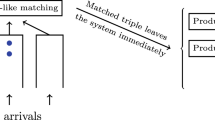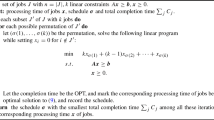Abstract
In a single-server polling system, the server visits the queues according to a routing policy and while at a queue, serves some or all of the customers there according to a service policy. A polling (or scheduling) policy is a sequence of decisions on whether to serve a customer, idle the server, or switch the server to another queue. The goal of this paper is to find polling policies that stochastically minimize the unfinished work and the number of customers in the system at all times. This optimization problem is decomposed into three subproblems: determine the optimal action (i.e., serve, switch, idle) when the server is at a nonempty queue; determine the optimal action (i.e., switch, idle) when the server empties a queue; determine the optimal routing (i.e., choice of the queue) when the server decides to switch. Under fairly general assumptions, we show for the first subproblem that optimal policies are greedy and exhaustive, i.e., the server should neither idle nor switch when it is at a nonempty queue. For the second subproblem, we prove that in symmetric polling systems patient policies are optimal, i.e., the server should stay idling at the last visited queue whenever the system is empty. When the system is slotted, we further prove that non-idling and impatient policies are optimal. For the third subproblem, we establish that in symmetric polling systems optimal policies belong to the class of Stochastically Largest Queue (SLQ) policies. An SLQ policy is one that never routes the server to a queue known to have a queue length that is stochastically smaller than that of another queue. This result implies, in particular, that the policy that routes the server to the queue with the largest queue length is optimal when all queue lengths are known and that the cyclic routing policy is optimal in the case that the only information available is the previous decisions.
Similar content being viewed by others
References
O.J. Boxma, H. Levy and J.A. Weststrate, Optimization of polling systems,Proc. Performance '90, ed. P.J.B. King, I. Mitrani and R.J. Pooley (North-Holland, 1990), pp. 349–361.
S. Browne and U. Yechiali, Dynamic scheduling in single server multi-class service systems with unit buffers, Naval Res. Logist. 38(1991)383–396.
S. Browne and U. Yechiali, Dynamic priority rules for cyclic-type queues, Adv. Appl. Prob. 21(1989)432–450.
M. Hofri and K.W. Ross, On the optimal control of two queues with server set-up times and its analysis, SIAM J. Comput. 16(1987)399–419.
H. Levy, M. Sidi and O.J. Boxma, Dominance relations in polling systems, Queueing Systems 6(1990)155–172.
Z. Liu and P. Nain, Optimal scheduling in some multi-queue single server systems, INRIA Report No. 1147 (Dec. 1989), IEEE Trans. Auto. Contr. AC-37(1992)247–252.
H. Takagi,Analysis of Polling Systems (MIT Press, 1986).
H. Takagi, Queueing analysis of polling models, in:Stochastic Analysis of Computer and Communication Systems, ed. H. Takagi (North-Holland, 1990).
D. Towsley, S. Fdida and H. Santoso, Design and analysis of flow control protocols for metropolitan area networks, in:High-Capacity Local and Metropolitan Area Networks, ed. G. Pujolle (Springer, 1991), p. 471–492.
J. Walrand,An Introduction to Queueing Networks (Prentice-Hall, 1988).
Author information
Authors and Affiliations
Additional information
This work was supported in part by NSF under Contract ASC-8802764.
Rights and permissions
About this article
Cite this article
Liu, Z., Nain, P. & Towsley, D. On optimal polling policies. Queueing Syst 11, 59–83 (1992). https://doi.org/10.1007/BF01159287
Received:
Revised:
Issue Date:
DOI: https://doi.org/10.1007/BF01159287




